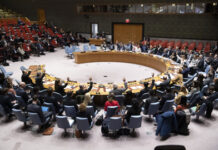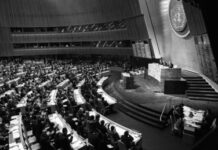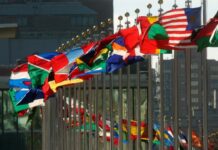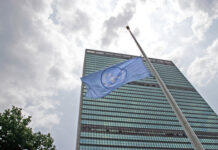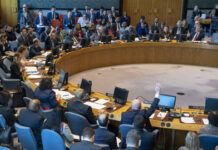Photo Credit: Global Diaspora News (www.GlobalDiasporaNews.com).
Call for Application: State of Peace and Security Report (Year 2022)
Background: Tana High-Level Forum on Security in Africa
The Tana High-Level Forum on Security in Africa (THLF) was established by the Institute for Peace and Security Studies (IPSS) at Addis Ababa University (AAU) and prominent African figures, such as the late Prime Minister of Ethiopia, Meles Zenawi. It was created as a response to the Tripoli Declaration of August 2009, which recognized peace and security as a shared “intellectual challenge” and called for “African-led solutions” to security challenges. The Forum aims to facilitate frank discussions among concerned decision-makers, peace and security stakeholders, and their wider communities about the African continent’s security issues and challenges.
Formal discussions on African peace and security are commonly held during institutional meetings like the African Union (AU), Regional Economic Communities/Regional Mechanisms (RECs/RMs), and on a national level. However, the Forum aims to enhance the efforts of these official decision-making bodies and their formal mechanisms by providing additional support. Accordingly:
- The Forum aims to provide a seamless platform for decision-makers and institutions to exchange their viewpoints on peace and security. Attendees can confidently anticipate gaining practical and motivational insights that can be implemented within their respective countries and organizations.
- The Forum offers African leaders the opportunity to engage in meaningful discussions and gather input from diverse individuals spanning the continent and beyond.
- Our goal is to actively engage in a significant and impactful dialogue regarding the essential issues of peace and security that affect Africa and its regional organizations.
- Our approach to promoting peace and security in Africa involves engaging in inclusive dialogue and actively listening to diverse perspectives from individuals and groups. Through this, we facilitate comprehensive discussions on all aspects of peace and security, encouraging collaboration among government and other African security stakeholders.
- The objective is to effectively raise awareness and inspire diverse groups and individuals in Africa to confidently take charge of developing innovative solutions for enhancing peace and security in the region.
It is expected that, through the implementation of such a broad mission, the conference will result in:
- Gaining a comprehensive understanding of the global perspectives on peace and security in Africa, while also delving into the distinct approaches taken by the continent to confront the multitude of challenges and opportunities associated with these critical factors. We are particularly focused on the African context and the innovative strategies that have been implemented to successfully address peace and security issues.
- Building a robust, diverse community committed to advancing peace and security. We accomplish this by providing inclusive platforms that foster dialogue, networking, and information sharing among policymakers, researchers, and practitioners. By enlisting leaders from various sectors to serve as advocates in building an African voice for both African and global security agendas, we ensure the sustainability of this initiative.
- Progressively engaging Africa in the continent’s strategic and proactive management of peace and security. Key to that effort will be developing foresight capacities throughout relevant African organisations in public, private and civil society sectors. Equally important will be developing strategic planning capacities and skills for the operationalization of national, sub-regional and continental long-term visions.
- Serving as a crucial platform for prominent figures to convene and establish mutual trust outside of traditional diplomatic contexts. This facilitates the development and execution of strategic initiatives by African leaders, leading to more efficient peace and security management throughout the continent.
The State of Peace and Security in Africa Report
The State of Peace and Security Report on Africa (SPSA) is expected to provide a concise but compelling overview and analysis of the most salient conflict trends and approaches for intervention. Conflicts in their despicable form are often abrupt and disruptive, their causes multidimensional, interlinked, and frequently transnational. There is a need, therefore, for an equally dynamic and correspondingly complex methodology that addresses it.
Against this background, the primary objective of the SPSA Report is to review the nature and evolution of peace and security prospects and threats on the continent and how key institutions, including the AU and RECs, are responding to these threats. Therefore, the report offers a nuanced understanding of the efforts and responses designed to manage complex peace and security challenges on the continent. The report will situate the selected theme of the year, “Africa in an Evolving Global Order”, within the broader context of conflict trends on the continent and offer an in-depth analysis of the issues surrounding it.
Scope of the Consultancy:
In line with the above, IPSS seeks to hire a consultant or a consortium (team of two) to perform the following tasks:
- Highlight the changing trends in conflicts, particularly in terms of national, continental, and global configurations.
- Outline the major factors or drivers of insecurity and violence and their consequences in African countries.
- Examine the cross-cutting trends of various extant security and structural predicaments of the year 2022 (considering previous SPSA report, i.e., 2021) – such as terrorism and extremism involving various terrorist groups, i.e., Boko Haram, Al-Shabaab, ISIS-affiliated factions particularly in the Sahel, Horn of Africa and the Lake Chad basin; insurgencies in Mozambique’s Cabo Delgado province, instability and violent conflicts in the Democratic Republic of Congo’s eastern provinces; Sudan, organized crimes, human and arms trafficking, illegal wildlife trade; ethnopolitical and inter-communal violence, piracy and maritime insecurity notable in the Gulf of Guinea, illegal fishing activities, cyber security threats, climate change and environmental challenges, weak governance and political instability and mercenarism – in different parts of the continent.
- Discuss peace initiatives and actors that have emerged and continued over the last year and prospects by analyzing the responses by African continental and regional institutions and non-governmental actors to these security prospects and threats – for example, unilateral, bilateral and multilateral peace initiatives.
- Provide an overview of the AU/United Nations’ (UN) security cooperation on addressing and mitigating the continent’s peace and security agenda.
- Interrogate challenges to African-led peace and security ownership in general and financing and reforming the AU and provide reflections on the merger of the Political Affairs Department and the Peace and Security Council of the AU (now PAPS). Particular attention should focus on examining the synergies and complementarities of the African Governance Architecture (AGA) and the African Peace and Security Architecture (APSA) in addressing and managing security challenges on the continent.
- As a highlight of the report, a case study on the AGA/APSA synergies regarding peace and security trends on the continent should be detailed.
- Provide recommendations on the way forward.
Specific Requirements and Reporting:
- Ensure that advisory services rendered are in accordance with IPSS consultancy guidelines.
- On reporting requirements, the consultant or lead consultant in the case of a consortium will report verbally and via email on a needs/activity basis in English to IPSS detailing the progress made regarding the consultancy’s objectives, services provided, and resources used.
- In addition to the SPSA Report, the consultant/consortium should provide a four-page executive summary suitable for consideration by the members of the Tana Technical Committee and the Board.
- The report will be written in close coordination with the Head of the Tana Forum Secretariat.
Qualifications:
To achieve the specified objectives, IPSS expects the selected pool of consultants to have the following qualifications and expertise:
- PhD degree or equivalent in a relevant discipline, e.g., International Relations, Development, Economics, Public Policy, Peace and Conflict Studies or Social Sciences.
- Ability to support analytical policy research and proven exposure to academic and policy research environments.
- Proven interest in peace and security in Africa.
- More than ten (10) years of experience in researching African peace and security issues.
- Possesses research skills and professional data collection and analysis.
- Experience in writing Academic and Policy papers/reports.
- Excellent command of English is required. In addition, good working knowledge of French is desirable.
Duration of Contract:
A duration of two months from the day of contracting. For the services offered, the consultant/consortium shall be paid a lump sum amount.
Submission of the Report:
A soft copy of the report shall be submitted to the Head of the Tana Forum Secretariat. The Head of the Secretariat is responsible for approving the report.
Place of Assignment:
Home-based with no travel obligations.
Deadline for application:
28 June 2022
To submit your application, please upload your CV and a 1-page synopsis on the theme: Africa in an Evolving Global Order at https://bit.ly/43AHDq1
For any query, please contact Frank Djan Owusu f.owusu@ipss-addis.org
Source of original article: Tana Forum (tanaforum.org).
The content of this article does not necessarily reflect the views or opinion of Global Diaspora News (www.GlobalDiasporaNews.com).
To submit your press release: (https://www.GlobalDiasporaNews.com/pr).
To advertise on Global Diaspora News: (www.GlobalDiasporaNews.com/ads).
Sign up to Global Diaspora News newsletter (https://www.GlobalDiasporaNews.com/newsletter/) to start receiving updates and opportunities directly in your email inbox for free.







